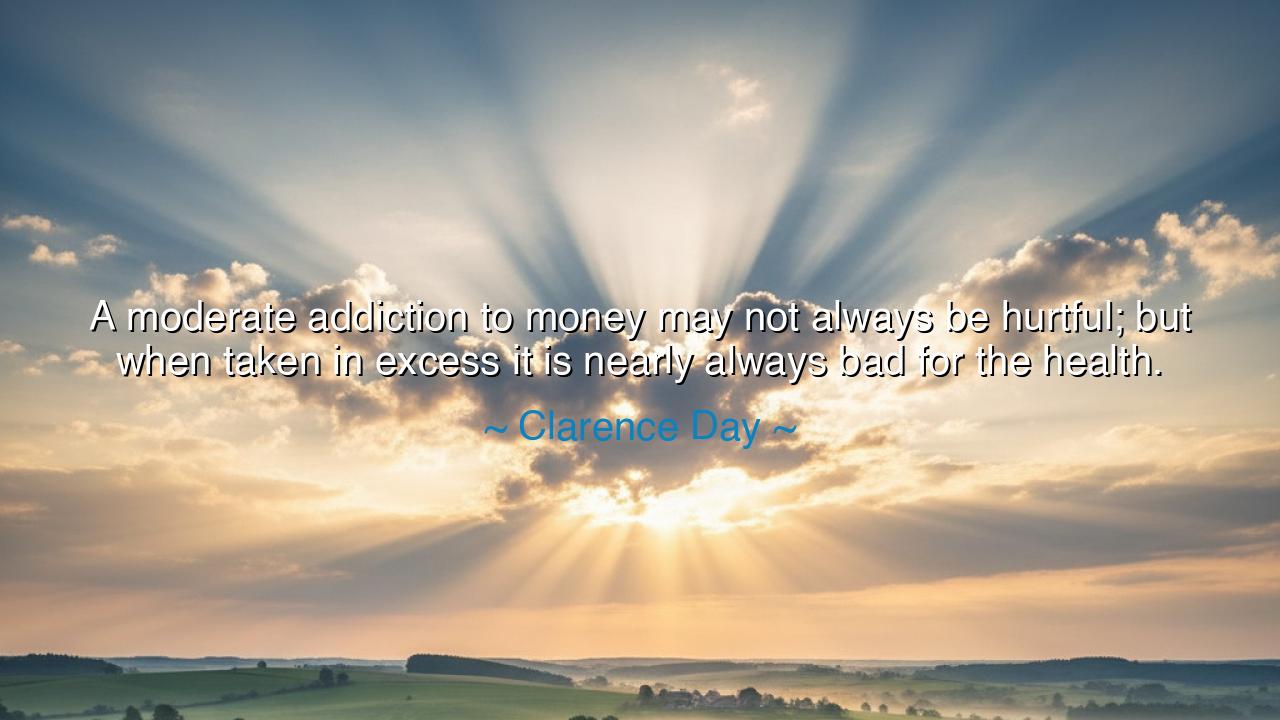
A moderate addiction to money may not always be hurtful; but when
A moderate addiction to money may not always be hurtful; but when taken in excess it is nearly always bad for the health.






“A moderate addiction to money may not always be hurtful; but when taken in excess it is nearly always bad for the health.” — Clarence Day
Hear now the words of Clarence Day, a man of humor and intellect, whose pen revealed the ironies of modern life. In this statement, he speaks not as a cynic but as a philosopher—one who has seen both the virtue and the poison in the pursuit of wealth. His words remind us that money, though necessary and even noble in measure, becomes a disease of the soul when consumed in excess. Like a medicine taken beyond its dose, what was once a blessing turns into slow destruction—of peace, of health, and of joy itself.
Day’s reflection comes from the wisdom of experience, for he lived in a time when the world was changing—the industrial age, the rise of fortunes, and the worship of wealth. He saw that the addiction to money was a new idol of his age, just as it is of ours. Yet he also understood that not all desire for wealth is evil. To seek enough to provide comfort, to nourish one’s family, to create and build—this is natural and good. The danger lies in the excess, in that subtle shift when wealth ceases to serve and begins to rule. Thus, his phrase “a moderate addiction” is the golden middle path: to possess money without being possessed by it.
The ancients, too, taught this wisdom. In the words of Aristotle, virtue lies between extremes—between greed and poverty, between indulgence and deprivation. The Stoics warned that wealth is neither good nor evil; it is the use of it that defines the soul. When a man’s mind becomes chained to his gold, his freedom decays, and even his body begins to follow. The anxious heart breeds sleepless nights; the envious spirit breeds disease. Excessive pursuit of wealth drains the vitality of the body as surely as it corrupts the integrity of the mind.
Consider the life of Croesus, the ancient king of Lydia, once hailed as the richest man on earth. His treasures filled palaces, his name became a proverb for wealth. Yet his heart knew no peace. He sought comfort in his gold and security in his riches, but both abandoned him in the hour of ruin. When his city fell to Cyrus the Great, Croesus stood upon the pyre of his own vanity, crying out to the heavens, “Solon! Solon!”—recalling the Athenian sage who had once warned him that true happiness cannot be measured in coins. Thus history confirms Day’s wisdom: excess in money, like excess in power, leads only to loss.
But Day’s words also contain compassion. He does not condemn ambition, nor does he preach poverty as virtue. Instead, he speaks as a healer of souls. He knows that in the modern world, money is entwined with existence—it feeds the hungry, sustains the sick, builds homes, and nurtures art. To despise money entirely is to deny the material needs of life. Yet to love it too deeply is to forfeit health itself, for one’s days become consumed by fear of loss and hunger for more. Balance, not renunciation, is the cure.
The lesson is clear: let money be your servant, not your master. Use it as a tool, not as a measure of worth. Let it flow through your hands with gratitude, but never let it bind your heart. Give generously, live moderately, and labor with purpose rather than greed. For true health, as Clarence Day reminds us, lies not in what one owns, but in what one is—peaceful in mind, sufficient in need, and rich in spirit.
So, my children of the striving age, remember this: gold may glitter, but peace is brighter. The body thrives on moderation, and the soul on contentment. Let your wealth be a river, not a reservoir—flowing to sustain, not to stagnate. For in the end, when the last coin has lost its luster and the hands that grasp it grow still, it is not fortune that endures, but the quiet wealth of a balanced life—the treasure of health, duty, and happiness united in harmony.






AAdministratorAdministrator
Welcome, honored guests. Please leave a comment, we will respond soon